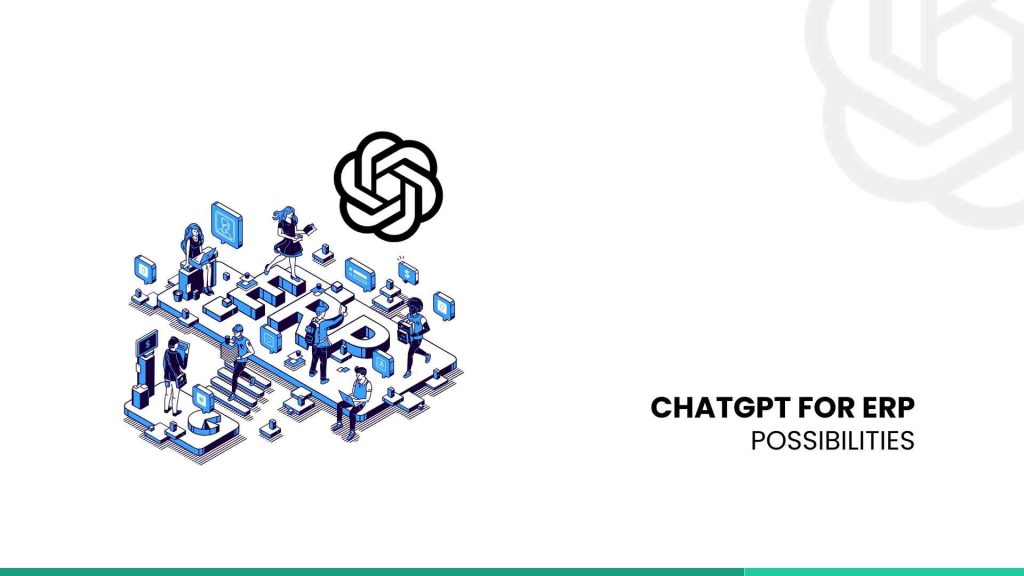ERP systems have long been the backbone of large organizations, streamlining processes, enhancing decision-making, and improving overall efficiency. Over the years, ERP systems have significantly evolved, including cutting-edge technologies such as AI and machine learning (ML), to stay competitive in today’s fast-paced business landscape.
One such technological marvel that is making waves in the ERP world is ChatGPT, a language model developed by OpenAI. We delve into the secrets and possibilities of integrating ChatGPT into ERP systems. We will explore the potential benefits, use cases, and considerations for organizations leveraging this powerful combination.
Understanding ChatGPT
ChatGPT is a descendant of the groundbreaking GPT-3 model, designed to generate human-like text based on the input it receives. It is pre-trained on a massive canon of text from the internet and can serve various natural language processing (NLP) tasks, including text generation, language translation, and sentiment analysis, with remarkable fluency and accuracy.
Under its deep learning architecture, ChatGPT can comprehend and generate human language in a way that closely resembles human conversation.
The Secrets of ChatGPT for ERP
Enhanced User Experience
One of the primary secrets of ChatGPT for ERP is its potential to revolutionize the user experience. Traditionally, interacting with an ERP system involved navigating complex menus and forms, which could be daunting for non-technical users.
With ChatGPT, users can interact with the ERP system using natural language, making it more intuitive and user-friendly. For instance, instead of manually inputting data into forms, a user can ask ChatGPT to update inventory levels or generate sales reports, streamlining processes and reducing the learning curve.
Real-time Insights
Another secret lies in ChatGPT’s ability to provide real-time insights and analytics. ERP systems generate vast amounts of data, and emanating actionable insights from this data can be difficult. ChatGPT can analyze data in real-time, answer questions, and generate reports on demand. It gives decision-makers instant access to critical information, enabling them to make informed choices that drive the business forward.
Automating Routine Tasks
ChatGPT can automate tasks within ERP systems, saving time and reducing human error. For example, it can automate order processing, invoice generation, and data entry tasks. By automating these repetitive processes, organizations can free their workers to focus on better value-added activities while improving accuracy and efficiency.
Scalability and Adaptability
ChatGPT is highly scalable and adaptable. It can be trained on domain-specific knowledge, allowing organizations to customize it for their ERP needs. Whether adapting to industry-specific terminology or incorporating company-specific workflows, ChatGPT can be tailored to fit any organization’s unique requirements.
The Possibilities of ChatGPT for ERP
Virtual ERP Assistants
Imagine having a virtual ERP assistant at your disposal 24/7. ChatGPT is a virtual assistant that assists users in guiding the ERP system, answering questions, and performing tasks. It improves efficiency and reduces the need for extensive training on the ERP software.
Natural Language Reporting
ChatGPT can generate natural language reports and summaries from ERP data. Instead of sifting through spreadsheets and charts, users can ask for an overview of sales trends, inventory levels, or financial performance, and ChatGPT will provide a concise, easy-to-understand response.
Predictive Analytics
ERP systems can incorporate predictive analytics by leveraging ChatGPT’s ability to analyze data and historical trends. It can help organizations forecast demand, optimize inventory levels, and identify potential issues before they escalate, leading to better decision-making and cost savings.
Multilingual Support
ChatGPT can provide multilingual support for global organizations, allowing users to interact with the ERP system in their preferred language. It facilitates communication and collaboration across diverse teams and regions.
Considerations and Challenges
While the possibilities of integrating ChatGPT into ERP systems are exciting, organizations must also consider some important factors:
- Data Security: ERP systems contain sensitive business data. Ensuring that ChatGPT adheres to strict data security protocols is essential to protect this information.
- Ethical Use: As with any AI technology, organizations must use ChatGPT responsibly and ethically, ensuring it doesn’t engage in biased or harmful behaviors.
- Integration Complexity: Integrating ChatGPT into existing ERP systems can require significant customization and development efforts.
ChatGPT for ERP systems represents a leap forward in enhancing user experience, automating tasks, and unlocking the full potential of ERP data. The secrets of ChatGPT lie in its natural language capabilities and adaptability, while the possibilities range from virtual assistants to predictive analytics and multilingual support.
As organizations continue to harness the power of AI and ML, ChatGPT emerges as a valuable ally in the ERP world, reshaping how businesses operate and make decisions in the digital age.
Using ChatGPT with Acumatica
In conclusion, integrating ChatGPT with Acumatica Cloud ERP presents a promising frontier in enterprise resource planning. As organizations strive for greater efficiency, streamlined processes, and enhanced user experiences, ChatGPT offers a powerful tool to achieve these goals. Whether it’s simplifying data entry, providing real-time insights, or enabling natural language interactions, ChatGPT’s capabilities align seamlessly with the needs of Acumatica users.
However, it’s essential to approach this integration with a thoughtful strategy, addressing considerations such as data security, ethical usage, and system complexity. With a well-executed implementation, the synergy between ChatGPT and Acumatica can pave the way for more agile, data-driven, and user-centric ERP solutions that drive success in today’s competitive business landscape. Feel free to reach out to us for a tailored ERP solution.

Vijay comes with a vast experience in ERP and enterprise solutions space with about 20 years of experience in various packaged application like Acumatica, SAP, Orion, Salesforce.com, SugarCRM and, SalesLogix.

